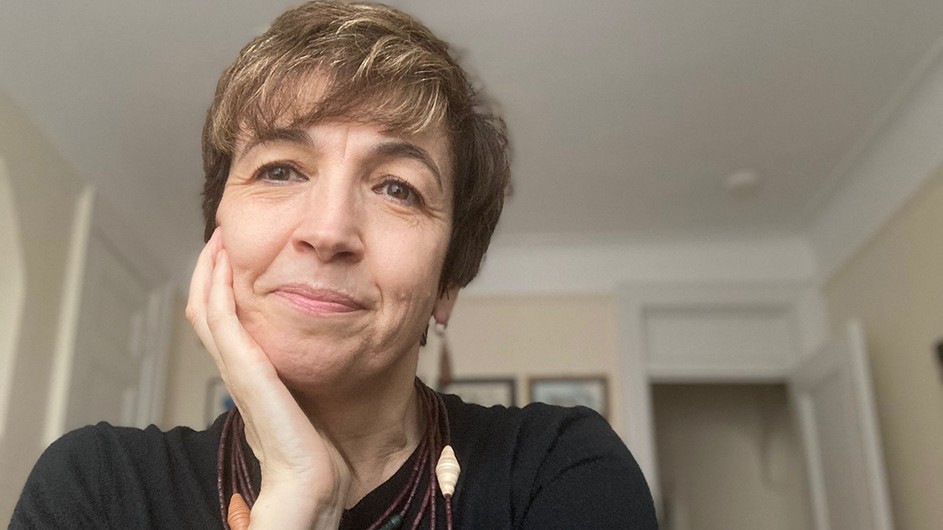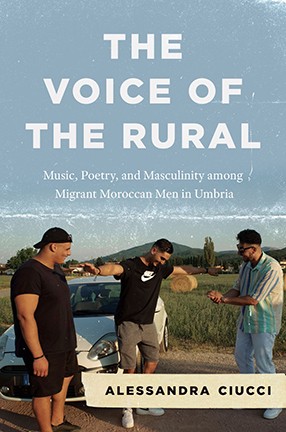A New Book Sheds Light on Migration and Belonging
Professor Alessandra Ciucci’s The Voice of the Rural is a contemporary portrait of migrant Moroccan men in Italy.

The region of Umbria in central Italy is known for its picturesque rolling hills and medieval villages, but to the many migrant Moroccan men who travel there, Umbria is better known for the tobacco fields, construction sites, small industries, and outdoor weekly markets where they work. Marginalized and far from their homes, these men turn to Moroccan traditions of music and poetry that evoke the countryside they have left—l-’arubiya, or the rural.
In The Voice of the Rural, Music Professor Alessandra Ciucci explores the lives of these Moroccan workers, unpacking the way they share a particular musical style to create a sense of home and belonging in a foreign, inhospitable nation. Along the way, she discovers how this culture of belonging is not just the product of the struggles of migration, but also tied to the reclamation of a masculine identity that is inaccessible to Moroccan migrants in Italy.
Ciucci talks about her book with Columbia News, along with where—and what—she likes to read, which musicians she most admires, and how she plans on spending her summer holiday in Italy.
Q. How did this book come about?
A. I stumbled onto a local notion of the rural (l-'arubiya) in music, poetry, and sound through the vicissitudes of fieldwork more than a decade ago in Morocco, in preparation for my dissertation on a class of female performers (shikhat). It was there that I developed a strong interest in sung poetry and, in particular, two interrelated, musico-poetic genres ('aiṭa and 'abidat r-rma) thought of as embodying the rural.
The experience of the rural reemerged with an unforeseen intensity in the compelling tropes used by migrant Moroccan laborers in Umbria and beyond. I was interested in exploring the listening practices of these migrants in which the rural unfolds during moments of sociability in both Italy and Morocco. The agricultural laborers and unskilled workers I write about in the book are not performers, and yet, if one listens attentively, music, poetry, and the voice of the rural are ubiquitous in their everyday lives. In focusing on how they listen to and understand this voice, I argue for migrants as agentive performers rather than abject laborers.
As an Italian, born and raised in Rome, I am acutely aware of the lamentable conditions and treatment of migrant laborers, in particular, Moroccan men. I focused on men because: (1) Moroccan migration to Italy had been predominantly masculine until at least the mid-1990s, and (2) a collective trauma caused by a colonial encounter between the so-called French Expeditionary Corps and the Italian population at the end of World War II. This encounter profoundly influenced the stigmatization, racialization, and othering of migrant Moroccan men.
Studies of migration need to consider the culture of origin, the circumstances of departure, and the attitudes toward migrants in the receiving society if migrants' lives—musical and non-musical—are to be understood. For these reasons, I also chose to focus on migrants from the same region (the Atlantic plains and plateaus of central Morocco), a rural population perceived as backward, unrefined, and, in turn, historically denigrated in Morocco as well. At this juncture, the voice of the rural becomes significantly entangled with a construction of masculinity, and what it means to be a "real man."
Lastly, I chose Umbria—especially the Alta Valle del Tevere—because I wanted to complicate the perceived bucolic and idyllic green character of the region. Rarely discussed as an important place of migration, Umbria supplies about 30% of Italy’s tobacco, a national product for a multimillion-euro industry in which the country is the top producer in Europe. Tobacco, however, could not be manufactured without the work of migrants. Tobacco has played a key role in attracting Moroccan men to Umbria, since this seasonal crop necessitates a large workforce (Moroccans make up about 70% of the migrant laborers). The Umbria I discuss in the book is quite different from the touristic image of the green heart of Italy.

Q. Can you give some examples from the book of the ways in which migrant Moroccan men in Umbria can reclaim through Moroccan music and poetry a sense of home and belonging?
A. The specific notion of the rural (l-‘arubiya) in music, poetry, and voice among migrant Moroccan men in Umbria that I discuss in the book allows these migrants to recover a way of being in the world, a space in contemporary Italy, and turn their ears away from an integrationist rhetoric that rejects their perceived difference. L-‘arubiya is the basis of their personhood, and it informs their listening practices. I explore how these migrants acoustically embody l-‘arubiya. Understanding the significance of a vernacular Arabic rooted in place and a rough vocal timbre thought to be unaffected by urban influences allows for an exploration of how l-‘arubiya reflects rural life, the land, and the peasants’ hard work. As one of my subjects in the book, Yassine, said:
“I came to Italy in 1998, when I was young. I married in Morocco, with our music. This music is in the blood; as soon as you hear it, you start dancing. It is a feeling that you use to break that absence, the absence of your country is inside you.”
“It is only through music that I get to exhale,” added Hassan, another subject. “I can’t listen to Italian music; the words don’t do it for me, it doesn’t put me in the mood. To exhale, I need the music of our region, the music we listen to at weddings back home.”
Q. What is your ideal reading experience (when, where, what, how)?
A. In general, I read more nonfiction and academic writing. I prefer to read during the day, and often sit at my desk so that I can take notes. I read fiction in the evening and, more often than not, sit comfortably at home.
Q. Are there any classic novels that you only recently read for the first time?
A. It depends what you mean by classic, but I have recently finished reading Carlo Levi’s 1950 The Watch, about Rome and Italy after World War II, and I'm currently reading Wole Soyinka’s 2021 Chronicles from the Land of the Happiest People on Earth, his first novel since 1973.
Q. Which musicians working today do you admire most, and why?
A. The musicians I worked with in Morocco are the ones I admire the most for their knowledge, but also dedication to what they do—the troupes of the Ouled Ben Aguida, Ouled Bouazzaoi, Shikh Sharqi, Abdelaziz Stati, Abidat Rma Khouribga, and many others. Thanks to them, I have learned to listen to the rural voice.
Q. What are your summer plans?
A. In the first part of the summer, I will be teaching Music of India and West Asia. Afterwards, I will head to Italy to celebrate Ferragosto on August 15 with friends and family. It is a holiday I love, as it gives you an excuse to sit around the table to eat, drink, talk, and even argue with your loved ones. The great 2008 film Pranzo di Ferragosto reflects the spirit of the holiday so well!